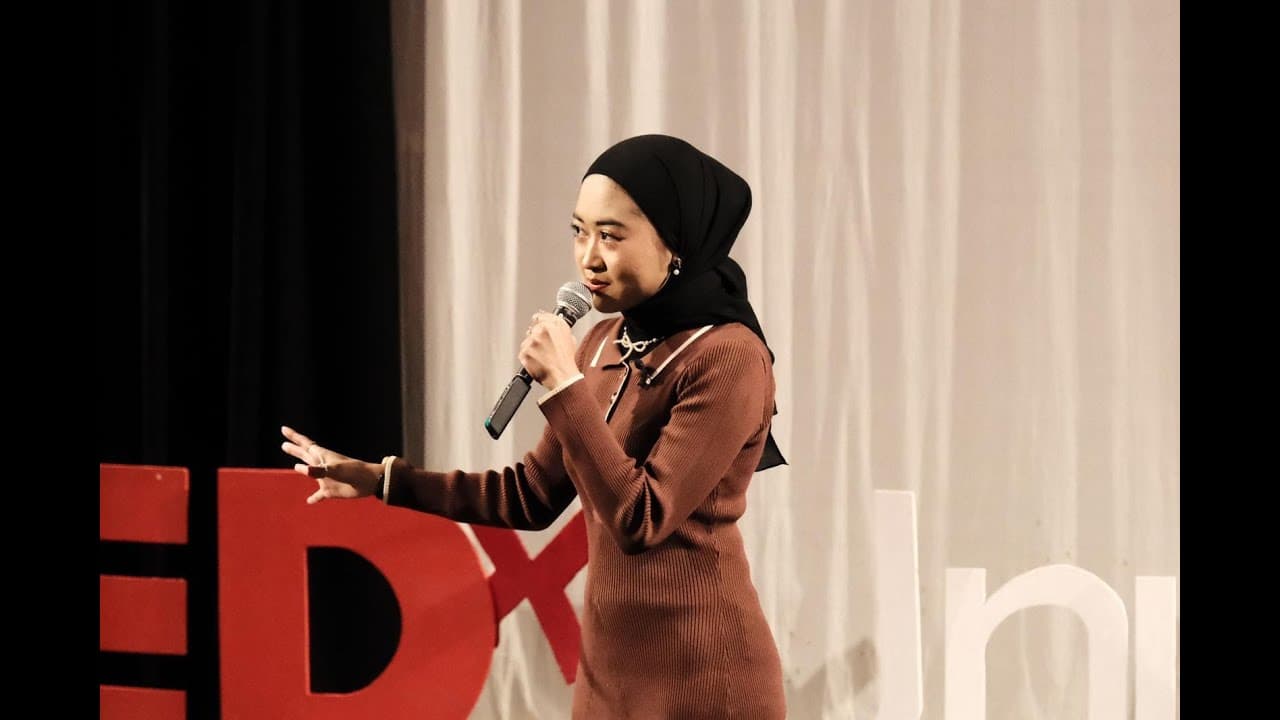Harnessing Empathy: Transforming Lives and Communities | Tika Tazkya Nurdyawati | TEDxUniMelb
16 Dec 2024 (4 months ago)

Growing Up and Discovering Empathy
- Growing up in the small town of Sang in Bandom, Indonesia, a deep love for flying kites was developed, but it was also noticed that not all neighbors were as fortunate, with many children standing on the sidelines watching longingly as others played (40s).
- This experience created a feeling of guilt and sadness, illustrating the first pillar of emotional empathy, which is feeling what others are feeling, whether it's sadness, happiness, anger, or anything else (1m47s).
- Emotional empathy is just the surface level of empathy, and there are two more pillars to be understood and cultivated in order to be a transformative force in personal and professional lives (2m4s).
The Pillars of Empathy
- The second pillar of empathy is cognitive empathy, which involves understanding others' perspectives, struggles, and nuances, and was developed after completing a bachelor's degree and participating in volunteer work in an underdeveloped region in eastern Indonesia (3m50s).
- Cognitive empathy allows for a deeper understanding of others and their place in a larger society, enabling more impactful and concrete actions to be taken, rather than just feeling overwhelmed by unpleasant situations (5m0s).
- The experience of cognitive empathy sparked questions about how to adopt this framework on a larger scale, particularly among Indonesian youth, in order to move towards a more inclusive society and achieve true harmony (5m58s).
Muda Empathy: Cultivating Empathy in Indonesian Youth
- This led to the creation of a small NGO called Muda Empathy, which aims to cultivate empathy and promote a more inclusive and harmonious society (6m31s).
- A non-governmental organization (NGO) focuses on addressing pressing issues such as education, climate change, poverty, inequality, and sustainable development, specifically the 16th Sustainable Development Goal, by engaging passionate youth and collaborating with governments, NGOs, and companies (6m34s).
- The impact of empathy is deeply personal and can transform individuals involved in the organization, making them better people, and the true achievement of a leader is not just accomplishing goals but also shaping the culture and dynamics of the group (7m27s).
Emotional Empathy in Action
- The NGO implements emotional empathy through social activities, such as supporting marginalized and disabled communities, including the Cancer Foundation and nursing homes (7m59s).
- A member, MTI, shared her story of feeling isolated before joining the organization, but after participating in social initiatives, she began to shed her victim mentality and realized that her struggles were not unique (8m24s).
- This realization is a common pattern among members and external participants who engage with the organization's social initiatives, helping them to heal and become stronger (10m12s).
Cognitive Empathy and Personal Growth
- The organization also incorporates cognitive empathy through regular discussions and events, which helps to enhance personal life and self-awareness (12m0s).
- A member, Kaa, who is now the Secretary General of the organization, shared her growth and development since joining as a teenager, highlighting the impact of cognitive empathy on her life (12m16s).
Paika's Journey: From Trauma to Empowerment
- A person with a very narrow worldview, primarily centered on themselves, experienced a traumatic event of being a victim of sexual harassment, which led to struggles with motivation and direction (12m59s).
- This person, Paika, was selected as a representation for the Aan Plus Youth Summit in 2023, which made her realize that she could contribute to addressing large issues (13m45s).
- The organization provides its members with a proactive feeling that the more kindness they do, the more it will come back to them and heal them (14m21s).
- Paika is now actively engaging with government cooperation in her organization and has become a licensed officer, creating inspiring content as a figure (14m54s).
- She has become one of the most outstanding students in her university, serving as president, and is actively helping and advocating for victims of sexual harassment (15m18s).
The Paradox of Empathy: Selflessness and Self-Fulfillment
- The empathy framework helps individuals become selfless, but paradoxically, it also self-fulfills them (15m53s).
- Empathy can be incorporated into everyday life, such as changing one's focus from personal ambitions to contributing to society, community, and humanity (17m1s).
- Successful people, like Mark Zuckerberg, use cognitive empathy to prioritize building better services over personal gain (17m12s).
The Nature and Nurture of Empathy
- Research has found that some people are born with heightened sensitivity, which may contribute to their empathetic nature (18m34s).
- The speaker's mother is an example of someone with heightened sensitivity, being easily moved to tears by various things (19m1s).
- Empathy is a key takeaway, and it is essential to recognize that empathy is not only given by nature but also a skill that can be nurtured (19m26s).
The Choice of Empathy: Embrace or Underestimate
- There are two options to decide on empathy: incorporate it or underestimate it, saying it's not relevant or too flowery (19m48s).
- Some environments value logic over feelings, and prioritizing rationality over empathy may lead to short-term accomplishments (20m8s).
- However, empathy is crucial for those who want to survive in the long term, as it provides a framework for long-term success (20m30s).
- The importance of empathy should be remembered, as it can transform lives and communities (20m37s).